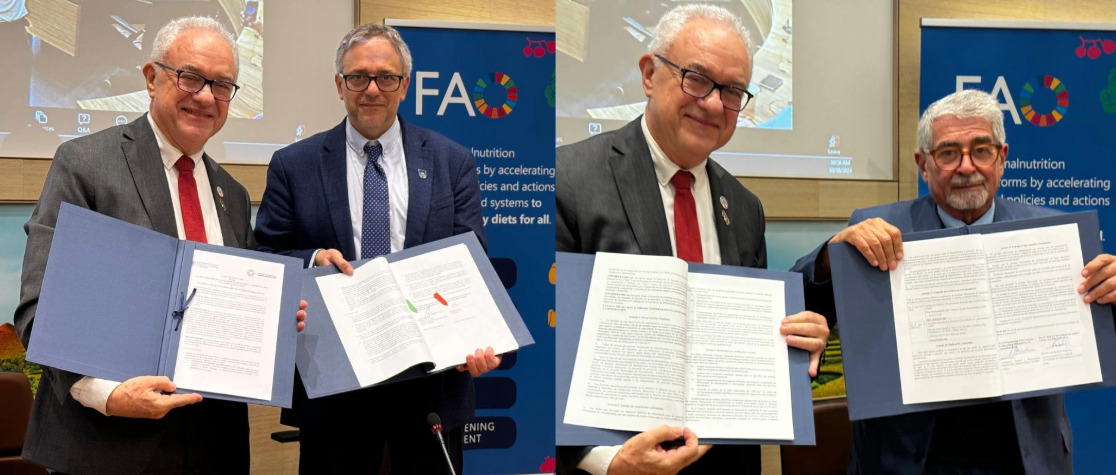FAO signs collaboration agreements with the largest university networks in Latin America and the Caribbean
The new agreements with the Association of Universities of the Montevideo Group (AUGM) and the Union of Universities of Latin America and the Caribbean (UDUALC) will lead to collaboration with more than 270 universities in the region through the FAO Campus program

©FAO
In the framework of the 2024 World Food Forum, the FAO Regional Office for Latin America and the Caribbean signed a Letter of Intent with the Association of Universities of the Montevideo Group (AUGM) and a Memorandum of Understanding with the Union of Universities of Latin America and the Caribbean (UDUALC).
These agreements will establish joint training programs, specializations, and postgraduate programs by incorporating FAO training resources into the curriculum of over 270 universities in the region through FAO Campus, the regional program for capacity development and knowledge management.
During the signing event in Rome, FAO Deputy Director-General and Regional Representative for Latin America and the Caribbean, Mario Lubetkin, emphasized that "strategic partnerships with the scientific and academic sectors are key to designing and managing public policies based on evidence, applied research, and technological innovation." Lubetkin highlighted that "these collaborations drive inclusive and sustainable solutions, with a transformative impact on communities, especially those in the most vulnerable situations."
In his speech, Lubetkin reiterated that these alliances "are fundamental for the future, as collaborating with strong networks like AUGM and UDUALC strengthens our mission and opens new opportunities to transform our agri-food systems."
Rodrigo Arim, rector of the University of the Republic of Uruguay and president of the Association of Universities of the Montevideo Group (AUGM), a network of 46 public universities in South America, highlighted the collaborative actions between FAO and various universities of the Montevideo Group, such as the conference "Challenges and Opportunities for Achieving Sustainable Agri-food Systems in Latin America and the Caribbean" held in September, and the specialization course "Public Policies for the Right to Adequate Food," held between July and August by AUGM, FAO Campus, and the Universidad Mayor de San Andrés of Bolivia, alongside the Observatory of the Right to Food and the Parliamentary Front Against Hunger of that country.
Likewise, Roberto Escalante, Secretary General of the Union of Universities of Latin America and the Caribbean (UDUALC), a network that brings together 226 universities in the region, recalled that FAO and UDUALC signed their first Memorandum of Understanding in 2014, from which the UDUALC Master's in Food Security was created. This program incorporated resources and knowledge from FAO and other international organizations and, in its eight editions, received almost 800 applications from professionals from various countries in the region. "We believe this is the time to renew our commitments and give new momentum to our collaboration," Escalante said.
The implementation of collaborative actions with these regional networks will be led by FAO Campus, a regional program that promotes the connection between academia and FAO's projects and programs in Latin America and the Caribbean. This opens new collaboration opportunities in the territories, drawing on the presence of academic institutions in the countries and the work of research and extension initiatives.
Additionally, these collaboration actions will align with FAO's new FAO Four Better Courses Initiative, recently launched globally, which aims to give new impetus to collaboration with academic and research institutions worldwide.
Contact
Maria Elena Alvarez Press and Content Officer [email protected]
